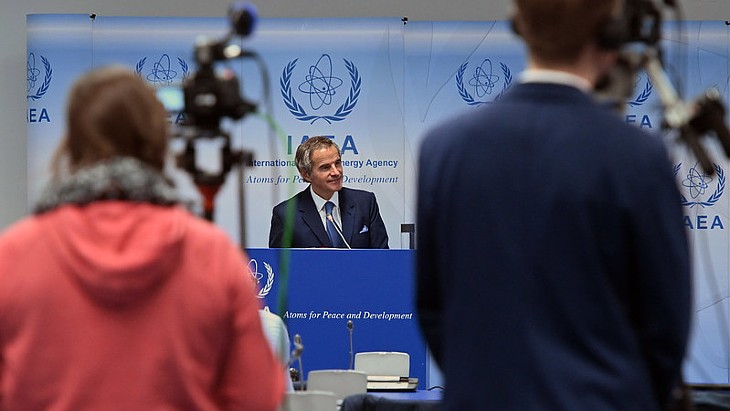Grossi hopes nuclear summit can agree new financing mechanisms
04 March 2024
International Atomic Energy Agency Director General Rafael Mariano Grossi says one aim of the forthcoming Nuclear Energy Summit for heads of state is to see what "international cooperation mechanisms we can agree" to accelerate the provision of new nuclear in line with the COP28 declaration in December.
 (Image: Dean Calma/IAEA)
(Image: Dean Calma/IAEA)
Grossi, speaking in a media conference following his report to the Board of Governors of the IAEA, was asked about the aims of the summit, the first such one for heads of state and government, being held in Brussels later this month.
He said "the summit is very important, it indicates how big the change is when it comes to the global discussion on nuclear energy". It had taken 28 UN climate conferences, Grossi added, until the countries taking part in the COP28 gathering had agreed that the provision of nuclear energy should be accelerated as part of a mix with renewables and every low-carbon source of energy.
"The fact that you are now having for the first time in history a summit of heads of state and government on nuclear is not to applaud this, it is to get together and to see what can be done to accelerate it, to carry out this acceleration. It is not an easy thing - you need the financing mechanisms for example, which are not easy," he said in the response to a question from the Chinese media.
"China is a powerful country. It can finance, but many other countries have problems and they still need more nuclear and want more nuclear. So what are the international cooperation mechanisms that we can agree at that level of heads of state and government so that this is accelerated. We have very high expectations of this summit."
His comments about Nuclear Energy Summit 2024 - which is being held on 21 March in Brussels and which he will co-chair with Belgium's Prime Minister Alexander De Croo - came after an interview with the London-based Financial Times in which he said he wanted to see multilateral lenders such as the World Bank and Asian Development Bank funding new nuclear projects, suggesting that past policies to not finance new nuclear was now "out of step" with most of their member countries.
Earlier, in his report to the IAEA Board of Governors, Grossi said the situation at the Zaporizhzhia nuclear power plant "continued to be very precarious", noting that IAEA inspectors at the plant had heard frequent explosions from the site in recent days, and he called for "maximum restraint and strict observance" of the UN-agreed safety principles such as neither side firing at, or from, the nuclear power plant.
He also gave updates on a variety of IAEA initiatives, such as tackling microplastics in marine environments, expanding cancer treatment technology and facilities and also Atoms4Food, which seeks to target food safety and control. He said many member states were backing it, which "gives me confidence we will soon be able to begin its implementation".
Grossi also highlighted the work the IAEA was doing with monitoring Japan's discharge of the ALPS treated water at the Fukushima Daiichi nuclear power plant and, on future deployment of small modular reactors, he said the various working groups involved in the Nuclear Harmonisation and Standardisation Initiative were aiming to finalise their reports by the end of 2024.
He also gave updates on the nuclear programme in Iran, calling on the country to "cooperate fully and unambiguously with the agency", and North Korea, saying there were signs of a site remaining occupied and prepared to support a new nuclear test, which "would be a cause for serious concern ... the Agency continues to maintain its enhanced readiness to play its essential role in verifying the DPRK’s nuclear programme".
In terms of foreign trips he has planned, he said he would be visiting Russia, Iraq and Syria in the next two weeks - with the visit to Damascus aiming "to re-establish a meaningful, constructive dialogue and process to facilitate the clarification of remaining issues from the past".
Researched and written by World Nuclear News